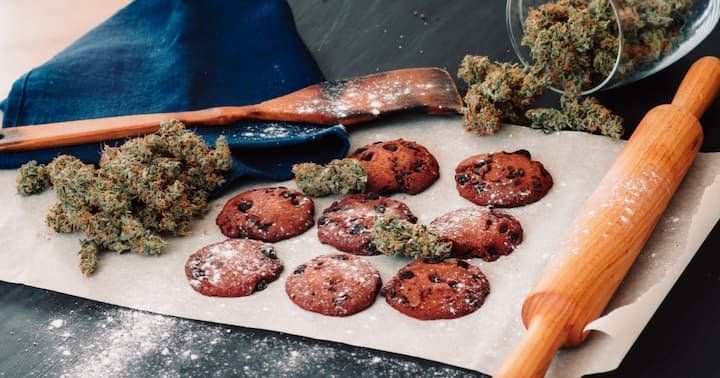Washington, D.C. legislators are working to clear the air (and plates) about CBD and other hemp-derived cannabinoids.
CBD, hemp-derived cannabinoids, and other hemp-derived cannabinoids that do not contain more than 0.3% THC by dry weight, are legal under the 2018 Farm Bill. Although the bill states that the FDA oversees these compounds, there are no clear rules about hemp-based food and drinks, which are widely available across the country but unregulated so far.
Despite the authority granted to the FDA, the agency contends it cannot regulate hemp-based products under the current system. Instead, they have asked Congress for clarification.
It is technically impossible to use CBD as a food ingredient or supplement since it is classified as a drug by the FDA. As a result of this legal gray area, hemp businesses and local governments have been concerned about whether these products are safe and compliant.
According to Shawn Hauser, partner at Vicente Sederberg, a leading cannabis law firm, the FDA's inaction has harmed public safety and the stability of the promising new hemp industry, which Congress clearly intended to have standard product oversight for consumable hemp products when it passed the 2018 Farm Bill.
A pair of bills would allow cannabinoids in food and create regulations
Two bills have been reintroduced by Reps. Morgan Griffith (R-VA) and Angie Craig (D-MN) that would legalize hemp-derived cannabinoids as food and food ingredients.
H.R. 841, the Hemp and Hemp-Derived CBD Consumer Protection and Market Stabilization Act, was introduced in early 2021 and would add hemp-derived cannabinoids like CBD to the list of approved dietary supplements.
The CBD Product Safety and Standardization Act (H.R. 6134), first introduced in December 2021, requires the Food and Drug Administration (FDA) to develop regulations on things like packaging, labeling, and cannabinoid dosage per serving.
"The importance of this long-overdue legislation that would remove barriers in existing law so that the FDA can regulate CBD and hemp derivatives as food and dietary supplements cannot be overstated," Hauser emphasized in an email. Consumers and industry desperately need basic and fundamental consumer safety regulations such as those allowed by these bills."
Since Minnesota legalized hemp-derived THC beverages and edibles last July, the number of hemp-derived THC items on the market has exploded. Rep. Craig believes the bills are essential to protecting consumers and supporting hemp producers.
In an interview with Hemp Today, Craig previously said, "In Minnesota, we've seen firsthand that our local governments and small businesses need more guidance when it comes to CBD and hemp-derived products."
Previously, H.R. 841 and H.R. 6134 failed to pass in Congress, but growing pressure from lawmakers and the hemp industry may turn the tide this time.
Although earlier versions of this bill have not progressed despite bipartisan support, the FDA announced that CBD cannot be regulated without Congressional action, which underscores the importance of Congress passing this legislation because of the increasing challenges consumers, regulators, and businesses face in an impossible 50-state patchwork.
CBD, hemp-derived cannabinoids, and other hemp-derived cannabinoids that do not contain more than 0.3% THC by dry weight, are legal under the 2018 Farm Bill. Although the bill states that the FDA oversees these compounds, there are no clear rules about hemp-based food and drinks, which are widely available across the country but unregulated so far.
Despite the authority granted to the FDA, the agency contends it cannot regulate hemp-based products under the current system. Instead, they have asked Congress for clarification.
It is technically impossible to use CBD as a food ingredient or supplement since it is classified as a drug by the FDA. As a result of this legal gray area, hemp businesses and local governments have been concerned about whether these products are safe and compliant.
According to Shawn Hauser, partner at Vicente Sederberg, a leading cannabis law firm, the FDA's inaction has harmed public safety and the stability of the promising new hemp industry, which Congress clearly intended to have standard product oversight for consumable hemp products when it passed the 2018 Farm Bill.
A pair of bills would allow cannabinoids in food and create regulations
Two bills have been reintroduced by Reps. Morgan Griffith (R-VA) and Angie Craig (D-MN) that would legalize hemp-derived cannabinoids as food and food ingredients.
H.R. 841, the Hemp and Hemp-Derived CBD Consumer Protection and Market Stabilization Act, was introduced in early 2021 and would add hemp-derived cannabinoids like CBD to the list of approved dietary supplements.
The CBD Product Safety and Standardization Act (H.R. 6134), first introduced in December 2021, requires the Food and Drug Administration (FDA) to develop regulations on things like packaging, labeling, and cannabinoid dosage per serving.
"The importance of this long-overdue legislation that would remove barriers in existing law so that the FDA can regulate CBD and hemp derivatives as food and dietary supplements cannot be overstated," Hauser emphasized in an email. Consumers and industry desperately need basic and fundamental consumer safety regulations such as those allowed by these bills."
Since Minnesota legalized hemp-derived THC beverages and edibles last July, the number of hemp-derived THC items on the market has exploded. Rep. Craig believes the bills are essential to protecting consumers and supporting hemp producers.
In an interview with Hemp Today, Craig previously said, "In Minnesota, we've seen firsthand that our local governments and small businesses need more guidance when it comes to CBD and hemp-derived products."
Previously, H.R. 841 and H.R. 6134 failed to pass in Congress, but growing pressure from lawmakers and the hemp industry may turn the tide this time.
Although earlier versions of this bill have not progressed despite bipartisan support, the FDA announced that CBD cannot be regulated without Congressional action, which underscores the importance of Congress passing this legislation because of the increasing challenges consumers, regulators, and businesses face in an impossible 50-state patchwork.




